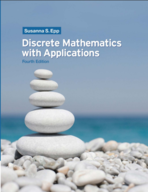Solved: Exercises 36 and 37 use the following definition: If f : R R and g: R R are
Chapter 7, Problem 37(choose chapter or problem)
Exercises 36 and 37 use the following definition: If \(f: \mathbf{R} \rightarrow \mathbf{R}\) and \(g: \mathbf{R} \rightarrow \mathbf{R}\) are functions, then the function \((f+g): \mathbf{R} \rightarrow \mathbf{R}\) is defined by the formula ( f + g)(x) = f (x) + g(x) for all real numbers x.
If \(f: \mathbf{R} \rightarrow \mathbf{R}\) and \(g: \mathbf{R} \rightarrow \mathbf{R}\) are both onto, is f + g also onto? Justify your answer.
Text Transcription:
f: mathbf R rightarrow mathbf R
g: mathbf R rightarrow mathbf R
(f+g): mathbf R rightarrow mathbf R
f: mathbf R rightarrow mathbf R
g: mathbf R rightarrow mathbf R
Unfortunately, we don't have that question answered yet. But you can get it answered in just 5 hours by Logging in or Becoming a subscriber.
Becoming a subscriber
Or look for another answer
